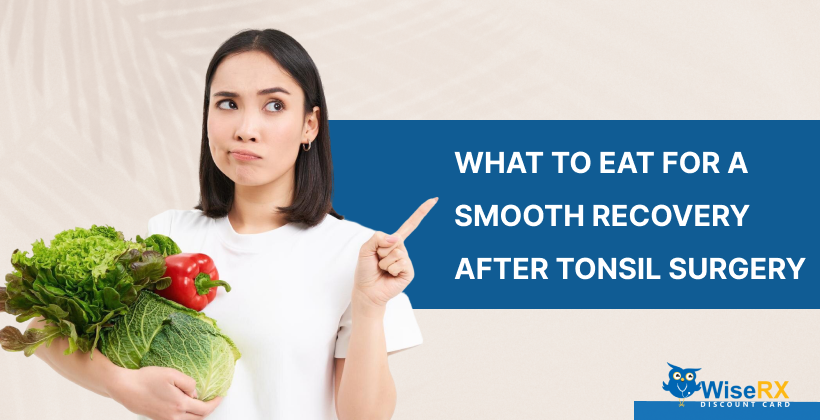
What to Eat for a Smooth Recovery After Tonsil Surgery?
Recovering from tonsil surgery (tonsillectomy) can be uncomfortable, especially during the first week when swallowing and eating are painful. However, your food choices play a crucial role in how quickly and comfortably you heal.
A proper diet reduces throat irritation, keeps you hydrated, provides essential nutrients for tissue repair, and minimizes risks of infection or bleeding. Consuming the wrong foods can delay recovery and make healing more challenging.
In this guide, we’ll cover:
• Why food choices matter after tonsil removal
• The best foods to eat after tonsil surgery
• Foods you should avoid
• Extra recovery tips
• FAQs about surgery timing, cost, and healing
Why Diet Matters After Tonsil Surgery?
Your tonsils are soft tissues located at the back of your throat. After removal, the area becomes raw and sensitive. Since this is where all food and drink pass through, it’s important to be gentle with your throat.
• Comfort: Soft, cool foods reduce pain and swelling.
• Healing: Nutritious meals provide the body with protein, vitamins, and minerals that accelerate tissue repair.
• Hydration: Drinking fluids helps prevent dryness, which can exacerbate pain.
• Safety: Certain foods can scratch the healing tissue and cause bleeding.
In short, your diet is as important as your medications and rest for recovery.
Best Foods to Eat After Tonsil Surgery
Here are some tried-and-true foods that are gentle, nourishing, and safe to consume while your throat heals:
1. Cold & Soothing Options
Cold foods help numb the surgical area and provide comfort.
• Ice cream (non-acidic flavors like vanilla or chocolate)
• Popsicles and slushies
• Chilled apple sauce or yogurt cups
• Cold smoothies made with bananas, berries, or oats
Pro Tip: Avoid citrus-based frozen treats (such as lemon or orange popsicles) because the acidity can be irritating.
2. Soft & Creamy Foods
These are filling yet easy to swallow.
• Mashed potatoes or sweet potatoes with a little butter or cream
• Scrambled or soft-boiled eggs
• Rice porridge
• Custard, pudding, and cream of wheat
3. Mild Soups & Broths
Soups provide hydration and nutrients, especially if you’re struggling to eat solids.
• Clear vegetable broth
• Chicken broth (if non-vegetarian)
• Lentil soup
Make sure soups are warm, not hot, to avoid irritating the throat.
4. Blended Fruits & Veggies
Smooth and packed with vitamins, they support the healing process.
• Mashed bananas or pears
• Steamed and mashed carrots, zucchini, or pumpkin
• Fruit smoothies with yogurt or nut milk
Foods to Avoid After Tonsil Surgery
Just as important as knowing what to eat is knowing what to avoid. The following foods can slow down healing or cause pain:
• Crunchy & Hard Foods: Chips, toast, popcorn, nuts, and crackers can scratch the throat and cause bleeding.
• Spicy Foods: Chili, hot sauces, and heavily spiced meals irritate the wound.
• Acidic Foods: Citrus fruits, tomato-based sauces, and lemonade can cause significant discomfort.
• Hot Foods & Drinks: Consuming very hot tea, coffee, or soups may exacerbate swelling and discomfort.
• Sticky Foods: Peanut butter or chewy candies can be hard to swallow and may stick to the throat.
It’s best to follow a soft diet for at least 10–14 days, gradually reintroducing other foods once your doctor gives the go-ahead.
How to Support Recovery Beyond Food?
While diet is key, a smooth recovery after tonsil surgery also depends on good self-care:
• Hydrate Often: Sip water throughout the day to prevent dryness.
• Rest Well: Your body heals best when you allow yourself to sleep and recover.
• Take Medications as Prescribed: Pain relievers and antibiotics are often prescribed after surgery to help manage pain and prevent infection. If cost is a concern, consider using a free Rx discount card like WiseRX® to save on prescriptions.
• Eat Small, Frequent Meals: Instead of three large meals, opt for smaller portions throughout the day.
• Avoid Strenuous Activity: Heavy lifting or exercise should be postponed until your doctor says it’s safe.
Day-by-Day Food Guide After Tonsil Surgery
To make things practical, here’s what your first few days might look like:
• Days 1–2: Stick to ice chips, popsicles, chilled water, broth, and gelatin.
• Days 3–5: Introduce mashed potatoes, yogurt, smoothies, and scrambled eggs.
• Days 6–7: Add oatmeal, rice porridge, soft pancakes, and pureed vegetables.
• Days 8–14: Gradually return to your regular diet while avoiding spicy, crunchy, or acidic foods.
FAQs About Tonsil Surgery
1. How long does tonsil surgery take?
A typical tonsillectomy lasts about 30–45 minutes, but recovery from anesthesia may take an additional hour.
2. What is the tonsil removal surgery cost?
The cost of a tonsillectomy varies widely, depending on factors such as hospital location, doctor’s fees, and insurance coverage. In the U.S., it can range from $3,000–$6,000 without insurance. Using a pharmacy discount card like WiseRX® can help reduce the costs of post-surgery medications.
3. How long does it take to recover?
Children often recover within 7–10 days, while adults may take 10–14 days. Pain usually peaks around day 3–5 before slowly easing.
4. When can I eat normal food again?
You can usually return to a normal diet after two weeks, but avoid crunchy and spicy foods until your doctor confirms that you are healed.
Conclusion
Recovery after tonsil surgery doesn’t have to be overwhelming. With the right diet of soft foods to eat after tonsil surgery—such as mashed potatoes, yogurt, smoothies, and soups—you can reduce pain, stay nourished, and heal faster. Avoid consuming crunchy, spicy, or acidic foods until your throat has fully recovered.
If medications are part of your recovery, remember that WiseRX® offers the best prescription discount card options to help you save money at pharmacies nationwide. With proper care, patience, and nutrition, you’ll be back to your regular routine feeling stronger than before.

